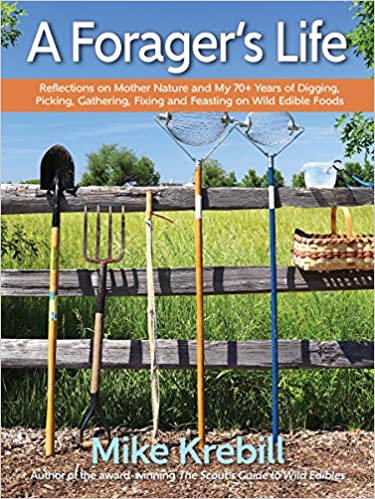Foraging: An Adventure and a Challenge
By George Graine, Fairfax Master Gardener
“We live in a vastly complex society which has been able to provide us with a multitude of material things, and this is good, but people are beginning to suspect we have paid a high spiritual price for our plenty.” — Euell Gibbons (1911-1975)
 Gardeners by their nature are outdoorsy folks. Now let’s take a step further beyond your comfort zone, and consider Mother Nature in her natural environment and learn how to harvest her bounty. To this end, Mike Krebill has written a new book that takes us out of the garden and into the woods. He has spent a lifetime learning the art of foraging and teaching the subject. Now he brings this adventure to you in a knowledgeable and authoritative way with his latest book, “A Forager’s Life: Reflections on Mother Nature and My 70+ Years of Digging, Picking, Gathering, Fixing and Feasting on Wild Edible Foods” (St. Lynn’s Press, 2021). This book definitely hits upon all of the points included in the sub-title. You may be surprised when you read how Mother Nature’s bounty can sustain you with edible wild food. Note that in 2017, Krebill’s first book won the prestigious 2017 National Outdoor Book Award for Nature Guidebooks. If “A Foragers Life” appeals to you, then “The Scout’s Guide to Wild Edibles” makes a good companion book.
Gardeners by their nature are outdoorsy folks. Now let’s take a step further beyond your comfort zone, and consider Mother Nature in her natural environment and learn how to harvest her bounty. To this end, Mike Krebill has written a new book that takes us out of the garden and into the woods. He has spent a lifetime learning the art of foraging and teaching the subject. Now he brings this adventure to you in a knowledgeable and authoritative way with his latest book, “A Forager’s Life: Reflections on Mother Nature and My 70+ Years of Digging, Picking, Gathering, Fixing and Feasting on Wild Edible Foods” (St. Lynn’s Press, 2021). This book definitely hits upon all of the points included in the sub-title. You may be surprised when you read how Mother Nature’s bounty can sustain you with edible wild food. Note that in 2017, Krebill’s first book won the prestigious 2017 National Outdoor Book Award for Nature Guidebooks. If “A Foragers Life” appeals to you, then “The Scout’s Guide to Wild Edibles” makes a good companion book.
Perhaps the name Euell Gibbons (quoted above) is familiar to you because in 1962 he wrote the best seller called “Stalking the Wild Asparagus.” He was truly an outdoorsman and an early advocate for eating healthy foods, i.e., a natural diet. You might have seen him on TV because over time he became a celebrity. Today, Krebill seems to have assumed the mantle of Gibbons after he left this earth. Furthermore, Krebill is more than an advocate for wild edibles. He is also a teacher and has given 50+ years of service to scouting. His passion and skills will enlighten you about the gastronomy that awaits you in the forest and how to sustain yourself with edible wild food. Gardening is a lifelong skill. In Krebill’s words, “Gardening also helped me to understand our connection to the soil that sustains us, and the need to take care of it. That, too, became a part of what I would teach others.”
Mother Nature is truly generous; however, you need to know and understand that not all forest food is good to eat. In fact some food could make you ill or worse. For sure, this admonition goes beyond the familiar exhortation to beware the mushrooms. Exception noted at the end of this paragraph. The Forager’s book makes all of these points by using fond memories, stories and includes 21 “interesting” recipes for wild edible food. These recipes are the most enjoyable part of the book. Here are just a half-dozen recipe titles: Hickory Nut Cake, Queen Anne’s Lace Pancakes, Wild Grape Jelly, Acorn Raisin Bread, Nici’s Black Walnut Fudge and, of course, a mushroom — Morels Pasta Alfredo.
In the 70’s, there was a major emphasis to save the environment. What has happened in the last 30 or so years? Ask yourself, where are we regarding environmental protection, ecology, environmental education and associated with that, environmental action? In other words, perhaps it is time to review Rachel Carson’s book “Silent Spring” that was published ten years earlier in 1962. Also, consider what Albert Schweitzer said, “Man has lost the capacity to foresee and to forestall. He will end by destroying the earth.” In essence, we are the stewards of the earth and we have a duty to preserve it.
In summary, Krebill’s anecdotes, useful insights, delightful recipes and helpful resources will help to explain the wonderful world of foraging. Think of this type activity as a sport or hobby but also know as well that the ability to forage can be a survival imperative.